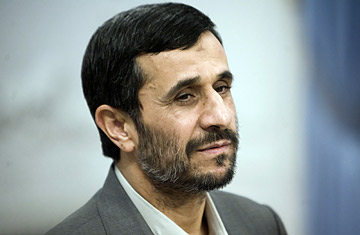
Iranian President Mahmoud Ahmadinejad
Correction Appended: Sept. 25, 2009
Iran's President, Mahmoud Ahmadinejad, has warned U.S. President Barack Obama against pressing Tehran about new revelations that Iran has been constructing a secret uranium-enrichment plant. "If I were Obama's adviser, I would definitely advise him to refrain making this statement because it is definitely a mistake," Ahmadinejad told TIME in New York City on Friday. "It would definitively be a mistake." His comment came as Obama, speaking at the G-20 summit in Pittsburgh, Pa., made a dramatic announcement that Iran has been constructing a second uranium-enrichment facility whose existence had been kept secret in violation of the non-proliferation agreements to which Tehran is a signatory.
Flanked by Britain's Prime Minister, Gordon Brown, and France's President, Nicolas Sarkozy, Obama warned that Iran would be held accountable if it failed to live up to its international obligations. Fearing imminent disclosure of the plant — which is being built into a mountain near the seminary city of Qum — the Iranians earlier this week wrote to the International Atomic Energy Agency (IAEA) to confirm its existence.
But in an exclusive interview with the editors of TIME that coincided with Obama's announcement, Ahmadinejad insisted that Iran was not keeping anything from the IAEA. "We have no secrecy; we work within the framework of the IAEA," he said. Still, the Iranian leader seemed nonplussed by the news that Obama was revealing the Qum plant's existence. Ahmadinejad's response meandered from the defensive to the aggressive. "This does not mean we must inform Mr. Obama's Administration of every facility that we have," he said, warning that if Obama brings up the uranium facility, it "simply adds to the list of issues to which the United States owes the Iranian nation an apology over." And he boasted that Obama's "mistakes" work in Iran's favor.
Western officials say the site is less extensive than the main enrichment plant at Natanz, containing only 3,000 centrifuges. (Natanz has 8,308 installed.) And it is still under construction and not yet producing enriched uranium, the officials say. At a news conference later in the day, Ahmadinejad confirmed that the site won't be operational for 18 months and said Iran's work on the facility was not a violation of the Nuclear Non-Proliferation Treaty. But as in the case of Natanz, the second plant's existence was initially kept secret and only acknowledged when Iran was about to be confronted with evidence of its existence.
Obama's attempt to hold Iran to account may disappoint many who have been closely tracking the U.S. effort to back Tehran away from the nuclear threshold — not because the President showed any lack of resolve, but because the resolve of others remains in question. The British and French leaders were adamant in their support, with Sarkozy warning that "if by December there is not an in-depth change by the Iranian leaders," tough new sanctions would be applied. Brown called the new development the greatest challenge facing the international community. But Germany, which has recently shown reticence to expand sanctions without approval from the entire European Union, was inexplicably absent from the event. Obama was left to explain that Chancellor Angela Merkel had a more pressing engagement. More important, after hinting in recent days that Russia might be willing to support broader sanctions against Iran, Russian President Dmitri Medvedev was absent from the rostrum, as was Chinese leader Hu Jintao. Both men are present in Pittsburgh for the G-20. Statements may come from those three countries expressing concern over the new disclosures, but their failure to appear alongside Obama in confronting the Iranians on the secret plant underscores Obama's difficulty in building a coalition to pressure Iran.
